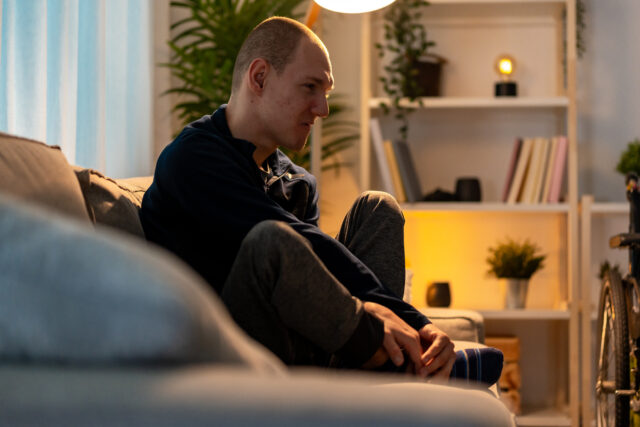Loneliness isn’t always easy to recognise, not in other people and not even in yourself.

In fact, some of the loneliest people are the ones who seem the most put-together or independent on the outside. However, underneath that image, there’s often a quiet ache—a sense of being emotionally disconnected, misunderstood, or simply unseen. Loneliness doesn’t always show up as isolation. Sometimes it hides in habits, deflections, and ways of coping. Here are some subtle traits that might reveal someone is struggling with more loneliness than they let on.
1. They brush off compliments or praise.

When someone constantly downplays positive feedback, it’s often not humility—it’s disbelief. They might not be used to hearing kind words, or they don’t trust them when they do. That lack of internal reinforcement usually comes from long periods of feeling unseen or undervalued. Brushing off compliments becomes a defence mechanism, not because they don’t care, but because they don’t believe anyone genuinely means it.
2. They over-apologise for small things.

Apologising when you bump into someone is one thing, but when someone constantly says sorry for taking up space, needing help, or expressing a basic emotion, it’s often a sign they’ve learned their presence feels like a burden. People who are deeply lonely often feel like they’re an inconvenience. The apology isn’t for what they did. It’s for existing in a world that rarely reassures them they’re welcome in it.
3. They’re fiercely independent, even when they don’t need to be.

There’s nothing wrong with being self-sufficient. However, when someone never asks for help, avoids relying on other people, or seems uncomfortable receiving support, it can be a mask for loneliness. As time goes on, loneliness can morph into hyper-independence. If no one’s consistently shown up for them, they’ve learned to expect that they’ll have to do everything alone, even if they’re quietly craving connection.
4. They rarely talk about their personal life.

Surface-level conversations are safe, but when someone constantly avoids talking about their relationships, feelings, or day-to-day experiences, it’s often a sign there’s no one in their life they feel emotionally safe with. It’s not that they don’t want to open up. It’s that they’ve likely been met with disinterest, dismissal, or judgement in the past. Keeping things vague feels safer than risking that all over again.
5. They’re often “the strong one” in their group.

People who are emotionally isolated often become the fixers, the listeners, the dependable ones. They’re the ones who check in on everyone else, but don’t feel they can ask for the same in return. Being the strong one becomes a lonely role, especially when it starts to feel like your worth is tied to how useful you are. Underneath that strength, there’s usually exhaustion that nobody sees.
6. They spend a lot of time online but rarely reach out first.

Scrolling endlessly, watching stories, liking posts—it can feel like connection. However, it’s often a substitute for it. People who are lonely might hover in the digital background while staying emotionally quiet. They crave connection, but the idea of initiating feels too vulnerable. So, they wait, and each day that goes by without a message makes them feel a little more invisible.
7. They over-explain themselves.

When someone gives long-winded explanations for simple things—why they cancelled, why they were quiet, why they chose what they chose—it’s often rooted in a fear of being misunderstood or judged. Lonely people tend to assume that other people are already looking for a reason to pull away. Over-explaining becomes a way to try to preempt rejection before it happens.
8. They laugh off their pain or self-deprecate to ease tension.

Humour is a powerful shield. Many lonely people use it to deflect attention from their real emotional state. They’ll joke about being “a mess” or make fun of themselves so no one else gets the chance. It makes other people more comfortable, but it often leaves them feeling emptier inside. That’s because even when they’re surrounded by laughter, they don’t feel like anyone’s really seeing them.
9. They never make plans too far in advance.

People who struggle with chronic loneliness often assume that plans won’t stick or that they’ll be let down. So, they avoid committing too early, or they cancel last-minute out of anxiety. It’s not flakiness. It’s fear of emotional disappointment. Saying yes to plans opens the door to hope, and hope feels dangerous when you’re used to things falling through.
10. They’re always “fine” but never great.

If someone always gives the same emotionally neutral response when asked how they are—never complaining, never celebrating—it might be a sign they’ve given up expecting anyone to actually care about the answer. Loneliness can dull your emotional range. It teaches you that being low is normal and that sharing joy is risky. “Fine” becomes the safest middle ground, even when it doesn’t reflect the truth.
11. They shrink their needs in relationships.

They don’t ask for the deeper conversation. They don’t clarify what’s bothering them. They don’t express frustration. Instead, they adjust, bend, and make themselves smaller. Loneliness can convince someone that being easy to be around is the only way to be kept around. So they avoid anything that feels like conflict, even if it means silencing themselves.
12. They disappear during emotionally heavy times.

When life gets overwhelming, they don’t reach out. They don’t want to be a burden. They might go quiet for weeks or months—not because they’re shutting people out, but because they don’t believe they’ll be met with real support. It’s a painful cycle. They want connection most when they’re struggling, but that’s exactly when they feel least deserving of it.
13. They hold onto casual interactions like they meant more.

A kind conversation with a stranger. A friend remembering something small. A coworker giving a genuine compliment. These moments can stick with lonely people for days, sometimes longer. That’s because they’re not used to being seen, even in small ways. When it happens, it hits deep—because it highlights the kind of connection they quietly crave all the time.
14. They’re overly accommodating, even to people who don’t treat them well.

Loneliness can make people lower their standards. They’ll tolerate disrespect, flaky behaviour, or emotional neglect because something is better than nothing, and walking away feels too risky. Being alone when you already feel isolated feels unbearable. So they stay in imbalanced dynamics, often convincing themselves it’s not that bad, just to avoid the deeper void of being totally on their own.
15. They don’t believe people are being genuine, even when they are.

Trust becomes hard when loneliness has rewired how someone sees the world. They assume kindness comes with conditions, that compliments have hidden motives, or that connection is temporary. That guardedness isn’t coldness. It’s self-protection. Because when you’ve been starved of real closeness for long enough, even warmth feels suspicious. That kind of isolation is hard to name, but even harder to shake.




